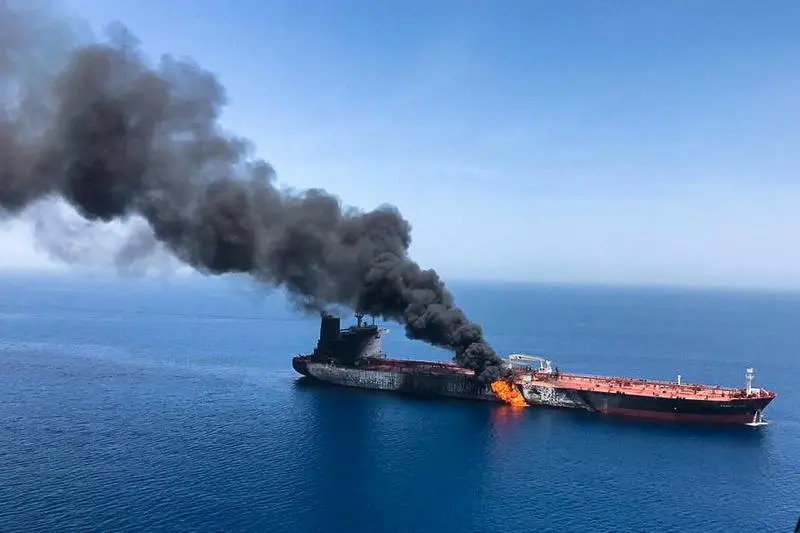PHOTO
NEW YORK (Reuters Breakingviews) - Perhaps a quarter of the world’s oil is shipped through the Strait of Hormuz. So threats to tankers in the area should worry traders. Yet a couple of attacks on Thursday brought only a 2.5% jump in the price of Brent crude, to just over $61 a barrel. It’s a mild reaction that puts a lot of faith in cool diplomatic heads.
Mike Pompeo, the U.S. secretary of state, blamed Iran for the attacks which left two tankers adrift even as Japanese Prime Minister Shinzo Abe visited Tehran. Tensions have simmered since U.S. President Donald Trump last year pulled out of a multilateral deal designed to limit Iran’s nuclear ambitions. The rhetoric thereafter has hardly been polite.
It’s possible to look back at prior Iran-related incidents and their impact on crude prices and take comfort. The U.S. Congressional Research Service did just that last August, discovering that more often than not they rose to some degree before the actual events in question, only to slide in the following month. That includes, for example, when the United States attacked Iran’s navy in 1988.
Short-term interruptions to oil shipping can be eased by releasing reserves. And in the medium and long term, market prices depend more on supply and demand than battles of words between governments, however inflammatory.
Yet this time there are reasons for greater concern. First, the standoff between Washington and Tehran is becoming pricklier, and any lasting Iranian throttling of the Strait of Hormuz would significantly affect supply. Second, crude prices have been volatile of late. They tumbled from a high of $86 a barrel as recently as last fall to the low $50s late in 2018, pushed back into the $70s this past spring and have been on the way down again. Another leg upwards wouldn’t be a surprise.
Financial-market traders seem to be hoping for the best in other ways. Their bets imply that the U.S. Federal Reserve will soon start cutting interest rates regularly, reversing several years of increases, when the central bank’s likely approach is more circumspect. Trump’s trade fights may not be resolved as easily as stock markets seem to expect, either. In the case of crude, relying on no one being dumb enough to let rhetoric turn into real conflict may be too sanguine.
CONTEXT NEWS
- Two oil tankers were attacked on June 13 and left adrift in the Gulf of Oman, driving up oil prices and stoking fears of a new confrontation between Iran and the United States. U.S. Secretary of State Mike Pompeo later, in a brief appearance, blamed Tehran for the incident without providing hard evidence to back up his stance.
- Washington accused Tehran of being behind a similar attack on May 12 on four tankers in the same area, a vital shipping route for oil.
- Tensions between Iran and the United States, along with its allies including Saudi Arabia, have risen since U.S. President Donald Trump pulled out of a deal last year between Iran and global powers that aimed to curb Tehran's nuclear ambitions.
- Iran has repeatedly warned it would block the Strait of Hormuz, near where the attacks happened, if it cannot sell its oil due to U.S. sanctions.
- The price of a barrel of Brent crude was up just under 2.5% to $61.42 in afternoon trading on June 13.
(Editing by Antony Currie and Amanda Gomez) ((richard.beales@thomsonreuters.com; Reuters Messaging: richard.beales.thomsonreuters.com@reuters.net))





















